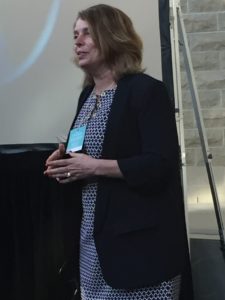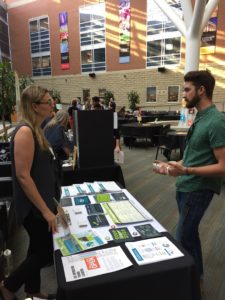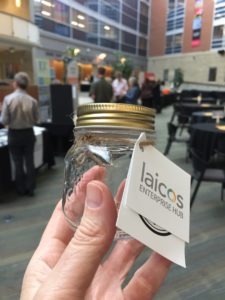When it comes to preparing potatoes, how to dispose of the peels is usually the last thing on the mind of any cook.
For local restaurateur and business leader Court Destauls, finding a creative method to reuse potato peels at the restaurants that encompass his The Neighbourhood Group of Companies was only one of many innovative ways that helped the Guelph-based family-owned company become a Certified B Corporation.
“We’ve been given an incredible gift, but it’s also an incredible curse,” said Destauls, company president, referring to the amount of waste created by the approximately 7,000 customers the Neighbourhood Group serves weekly between its four restaurants -The Wooly Pub, Miijidaa Café & Bistro, and Borealis Grille & Bar in Guelph and Kitchener.
However, just how Destauls and his team turned that ‘curse’ into an even larger ‘gift’ formed part of an address he shared May 16 at The Power of Social Enterprise In The Food Industry event held at the University of Guelph’s Summerlee Science Complex. More than 70 people attended the event, organized by the LAICOS Enterprise Hub, of which Capacity Canada is a key member.
In partnership with the university, the ‘Hub’, which includes 10 organizations along the Kitchener to Toronto corridor who support the development of businesses and non-profits with incubation and acceleration services, played host to an assortment of community partners who used displays to promote the value social enterprise has in the food industry.
This is a topic close to Destauls heart, who along with Kathleen Rodenburg, assistant professor with the university’s School of Hospitality Food and Tourism Management, provided keynote addresses at the event.
Destauls said before the Neighbourhood Group became a Certified B Corporation (which is achieved by a for-profit business after meeting rigorous standards of social and environmental performance), he discovered inspiration in Patagonia founder Yvon Chouinard’s book Let My People Go Surfing which focuses on Chouinard’s journey to create a more environmentally-responsible company.
“It (the book) really motivated me into thinking about what we could do to be better,” he said.
For starters, Destauls and his team spent three months weighing the food waste and recyclables disposed at the company’s four restaurants. Their investigation determined approximately 1.3 pounds of waste was produced by each customer, which translated into a staggering 473,000 pounds annually per client.
“That was probably one of the saddest moments I ever experienced in my career,” he said, referring to that discovery.
To find ways to reduce that amount, Destauls and his staff began analyzing what customers wanted and didn’t want as each plate was returned to the kitchen. “We’re not rocket scientists, we’re restaurateurs,” he joked.
Besides reusing potato peels, which Destauls said wound up diverting 20,000 pounds of food waste annually, other simple measures the company undertook included cutting out bread service and cutting back on ketchup unless customers indicate otherwise.
“It just took us a few months to figure that out,” he said, referring to these changes and others.
Changes like these and a move towards more sustainability in the food industry forms the core of the United Nations’ Transforming our World: 2030 Agenda for Sustainability initiative, which Rodenburg touched on during her enlightening presentation.
“The way that we’ve been operating, we’ve created a ton of paradoxes,” she told the audience. “Some very strange paradoxes.”
The first Rodenburg noted was the fact the UN has identified that 815 million people in the world as ‘going hungry’ despite the fact we should be able to produce enough food to feed them all.
“Yet on the other hand, our world is obese,” she said, adding that 26% of Canadians fall into this category compared to 40% in the United States.
Rodenburg outlined the impacts some modern farming techniques and climate changes are having on our ability to feed the world. “Yet another paradox is that we throw a ton of food away, so much food,” she said, noting a rise in population isn’t helping the situation. “Tonight, at dinner, we will have 216,000 more people showing up at the dinner table.”
Rodenburg also touched on the fact income levels were rising in many emerging economies, which is a positive thing. “But what we’re seeing is this big shift of changing diets. They’re moving towards more North American animal-based protein consumption.”
She said many families in these emerging economies are now experiencing more ‘foodless’ days.
“We have got some major challenges, but the good news is we all need to work on this and we have people working on this,” said Rodenburg, referring to economists and the UN and its 2030 Agenda.
However, although Canada performed well as outlined in the Food Sustainability Index, which ranks countries regarding their food system sustainability, Rodenburg said we should not get “too comfy.”
“We are still big contributors to the food waste issue of North America,” she said.
It’s an issue that clearly resonates with Destauls, who has now seen the amount of waste produced in his restaurants reduced to .7 pounds per customer, which in turn has helped in other ways.
“We became more profitable and we were able to start driving that money back into our community,” he said.
One of the charitable causes The Neighbourhood Group has become involved in is the Lucky Iron Fish initiative, which was started by students at the University of Guelph. It centres on providing a small iron cooking tool, shaped like a fish, that can infuse meals with a healthy portion of natural iron. To date, Destauls said his company has provided 1,600 of the small iron pieces to marginalized communities across Canada.
However, besides helping others, Destauls said the simple changes they’ve made at the restaurants have also benefitted the staff through the implementation of health and training benefits, as well as ensuring kitchen staff members have a living wage.
“Our retention levels are high. Our kitchen staff lives have become much better,” he said. “They can now actually take time off, work less hours, and spend more time with their family and friends.”
As a result, Destauls said the staff have come with up with their own initiatives, including planting pollinators in every able space and implementing a ‘straw free’ environment.
“We’ve been given a great curse, serving 7,000 people per week. But more importantly, it’s been a great gift because we are able to be in direct contact with 7,000 people a week to start making these changes and start influencing peoples’ buying decisions,” he said, before urging the audience to ‘vote’ with their wallets.
“Create change with it (money) in every single decision you can make every day,” said Destauls.
It was a message not lost on Marvin Dyck, Brewmaster at Wellington Brewery in Guelph, one of three breweries invited to the event to offer taste tests.
“So many people think of these things, be it curbing greenhouse gases or whatever, as costing a lot of money for a business,” he said, adding his brewery has undertaken many changes to promote sustainability by updating to more energy efficient equipment.
“It gives us the capacity to look at different projects,” said Dyck.
He said one of these projects is being done in partnership with the university and involves incorporating food waste, including fruit waste, to create flavoured beer.
Sandra Hanmer, Executive in Residence at Capacity Canada, said bringing together people like Dyck, Destauls and
Rodenburg to share their knowledge and experiences was a benefit to those in attendance and exemplifies what LAICOS Enterprise Hub is all about.
“What really struck me with both presentations were the simple things and the power of the impact that can be made by simple little things,” she said. “There was a lot more interaction at this event and opportunities for students who are thinking of new initiatives and meeting with businesses that are actually working it out.”
Besides Capacity Canada, the ‘Hub’ also includes CBaSE, Communitech, Innovation Guelph, Kindred Credit Union Centre for Peace Advancement, the Schlegel Centre for Entrepreneurship and Social Innovation, Small Business Centre Waterloo Region, St. Paul’s GreenHouse, Velocity Garage and Waterloo Wellington Local Health Integration Network.

